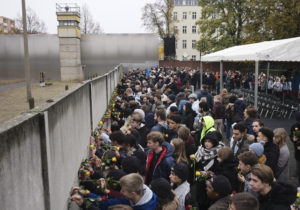Brussels Summit Will Not Avert Eurozone Crisis
At the close of an economic summit that appears to have failed to rescue Italy, Spain and more of Europe from sinking deeper into a mire of recession, Guardian economics editor Larry Elliott prefigures the collapse of the euro as a unifying currency of the European Union. (more)
At the close of an economic summit that appears to have failed to rescue Italy, Spain and more of Europe from sinking deeper into a mire of recession, Guardian economics editor Larry Elliott prefigures the collapse of the euro as a unifying currency of the European Union.
Across the board, pro-austerity responses to a complex of economic crises won the day, with nothing offered in the way of long-term structural reform. London will be spared the worst for a while, Elliott writes, “but the rest of the country will be laid waste.” When that happens, “the summit will be seen in its true light: another lurch up a blind alley for Europe and a Pyrrhic victory for Britain.”
Grimmer words rarely appear in the respected press. –ARK
Your support matters…Larry Elliott at The Guardian:
Europe is sleepwalking into a prolonged depression. The prospect of 2012 seeing the start of the break-up of the eurozone is a real one. Financial markets are already starting to pick apart what looks like the latest, if more sophisticated, attempt to kick the can down the road. Britain has isolated itself on the fringes of the European Union, perhaps the most significant development at a summit that assuredly did not draw a line under the crisis in the single currency. But at least the interests of the City of London were defended. For now.
In short, the summit that was supposed to save monetary union has been little short of disastrous. Going into the talks, the markets hoped for a happy ending to the sovereign debt saga: a deal to pave the way for the European Central Bank to ride to the rescue of Italy and Spain, under siege from the bond vigilantes. What they got instead was political schism, half-baked reforms and the complete absence of any fresh economic thinking.
The markets, frankly, were always absurdly optimistic about the outcome for the summit but, even so, it could still have had positive results. Three things were needed to make it a success: there had to be a strategy for growth that went beyond calls for ever-greater austerity and long-term structural reform; there needed to be a real commitment from member states to put their public finances in order; and the ECB had to show a willingness to do whatever was necessary to bring down bond yields in the troubled periphery of the euro area.
Not one of those objectives has been achieved.
Independent journalism is under threat and overshadowed by heavily funded mainstream media.
You can help level the playing field. Become a member.
Your tax-deductible contribution keeps us digging beneath the headlines to give you thought-provoking, investigative reporting and analysis that unearths what's really happening- without compromise.
Give today to support our courageous, independent journalists.






You need to be a supporter to comment.
There are currently no responses to this article.
Be the first to respond.